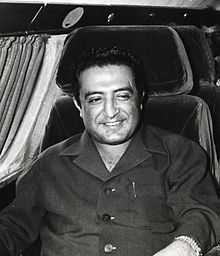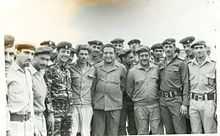Ibrahim al-Hamdi

Lieutenant-Colonel Ibrahim al-Hamdi (1943 - October 11, 1977) (Arabic: إبراهيم الحمدي) was the leader of a military coup d'etat in Yemen Arab Republic that overthrew the regime of President Abdul Rahman al-Iryani on June 13, 1974. After the revolt, he was President of the Military Command Council that governed the country. During his rule, he cemented the central government's control over the country, planned on ending tribal loyalty, and Yemen's medieval social classes by proclaiming all Yemenis as equal. He also improved relations with Saudi Arabia.
His Upgrowth and his way to the presidency
His oldest brother said that Ibrahim was in one day of his early childhood playing near the pond filled with water in his father Mohammed Al-Hamdi. When he approached more to the edge, and began to touch water when he saw his image on the surface of the water net pool, then he tried to save that drowning man who faced because of his childhood innocence, causing him to slide in the pool, luckily some of his family members were there to save him after his stomach filled of water. In his adulthood - specifically in its infancy- when he was an associate for his father impartial judge learned him everythings about Islamic law while he was studying in the Aviation College to become a pilot, but did not complete that studies and continued working with his father as a judge in court of Dhamar in the reign of Imam Ahmed Yahya Hamid al-Din where has raised a lot of controversy wonders and attention to his smart skills at the same time.
Then he became in the era of President Abdullah as-Sallal the commander of the commandos, then the responsible for the western, eastern and central provinces in 1972 then he was promoted to become the Deputy Prime Minister for Internal Affairs, then he was appointed to the position of the higher representative Commander of the Armed Forces, then in 13 June 1974 he was an effective member of the officers who ran the white military coup overthrewing the Judge Abdul Rahman al-Iryani in the revolutionary correction movement of June 13, 1974 and handed over all the president's and the member's of the republican council authorities to the military forces which represented in the leadership of the general and senior officers mentioned: Ahmad Ghashmi, Yahya Mutawakil, Mujahid Abu Shawareb, Ali Al-Shibh, Hammoud Pedder, Ali Alilla'a, AED Abu meat, Ali Abu lohoum, and added later Abdaziz Abdul Ghani and Abdullah Abdulalim.
The Revolutionary Correction Movement of 13/6/1974

The thirteenth corrective movement was led by Colonel Ibrahim al-Hamdi. Hamdi aimed to correct the Yemeni revolutionary path, to get rid of a "legacy of decadence." He primarily sought to calm tribal feuds, and regional conflicts, which had been prevalent under previous rulers. Thus, security was his top concern. He also promoted financial reforms to put an end to favoritism and bribery. He created committees to implement these reforms, saving an estimated tens of millions of Riyals.
Furthermore, he initiated a large infrastructure plan, paving thousands of kilometres of dirt roads, building thousands of schools and hundreds of clinics and health centres. He encouraged people and many non-local investors to invest in the sections of agriculture and local manufacturing. This period saw rising standards of living and much prosperity.
Also the government has implemented the triple UNDP, produced a strong ground for the northern part of the country to start in the developments and implementations of the quinary plans, that routed Yemen to keep up with the twentieth century development . Due to the efforts of the leadership of the thirteenth of June movement, which have carried out the first phase of the first quinary Plan with great success .and Yemen achieved through it tremendous strides on the path to build the new Yemen, where the average of growth exceeded (6.5%) of it was planned. In addition the Yemeni's life shifted from suffering life to prosperity life .The physical appearance showed signs of grace and comfort. Yemeni expatriate has raised his head high in that era in the citizen migratory, after having been stooping his head for a long period of time. In national affairs, al-Hamdi brought good relations between the two parts of the country, a few steps from unity, until the intervention of foreign powers interrelated with strong dark interior to assassinate the uncompleted Yemeni dream.
Accomplishments at his tenure
On the first day the of his presidency and after a quick review in important topics and crowded agenda, he issued emergency order to stop media campaigns against the South and its leadership with assertion that the unity will remain the only option for the Yemeni people no matter how varied opinions and attitudes, because it is a great goal needs a mighty sacrifice. Immediately President Salim Rubai Ali famous as "Salmeen" reciprocated the same desire and the same sense,setting a strong relationship between two of them which has taken a personal nature more than the official.
It seemed this man has started his presidency path with arduous efforts and assisted by a group of young faces qualified academically to build a modern government based on law, order and institutions. It was a difficult task but not impossible for a commander collected in his persona the power and the model, plus his culture and excellence through his civilian and military experiences, and what was more important is the honor that observed from his family when he worked as a judge (during his short experience in the judiciary while the absence of his father Judge Mohammed Saleh al-Hamdi all provisions was ending to between the rivals) so he learnt two rules that justice is the base of governance,and the base of governance is the fear of the God. thus he has proved his worth as a national leader through several Workers in addition to justice, including:
- Ordered to suspend the words of Mighty God instead of - his image.
- Put down all military ranks, which amounted to inflation and their holders to satiety providers including his rank to attributed the soldier's and officers lost prestige .
- Prevented the use of government vehicles and military or public institutions cars for personal purposes.
- Increased the salary along with four additional salaries in some occasions like Eid al-Fitr and Eid al-Adha, the anniversary of the revolution and the anniversary of the thirteen of June movement.
Under al-Hamdi's administration Yemen enjoyed the most prosperous economic boom since 1962, as he was responsible for a civil engineering endeavour that would rival that of any country.
Assassination
Al-Hamdi's murder was never officially investigated. Two French female dancers were also killed during this murder. The killers wanted to paint Hamdi as romantically involved with the women, along with his brother. This was done to discourage Hamdi loyalists and relatives from pursuing an official inquiry into the murder of the President and his brother Abdallah; commander of a special unit known as El-Saaqah. A general of the Yemeni armed forces (Al Jarbani), during a television interview with Suhail TV of April 2011, named Ali Saleh, the then President of Yemen, as the executor of the murder of Ibrahim Al-Hamdi. And being during his 33-year reign an expert of murders, assassinations, and extortion, according to Al Jarbani.
Al-Hamdi's civil and economic policies helped bring Yemen into the 21st Century by building hundreds of new schools and eleven hospitals countrywide as well as the paving of more than 2,000 roads, He also planned on improving ties with Marxist People's Democratic Republic of Yemen. On October 11, 1977 al-Hamdi was murdered along with his brother by Saudi Arabian funded agents believed to be from the Al-Ahmar tribe who are known dependents of the Saudi monarchy. Their goal was to slow down the progress of Yemen's unification. To this day al-Hamdi remains as Yemen's most beloved President.
References
External links
| Wikimedia Commons has media related to Ibrahim al-Hamdi. |
| Preceded by Abdul Rahman al-Iryani |
President of North Yemen 1974–1977 |
Succeeded by Ahmed al-Ghashmi |
| ||||||||||||||||||